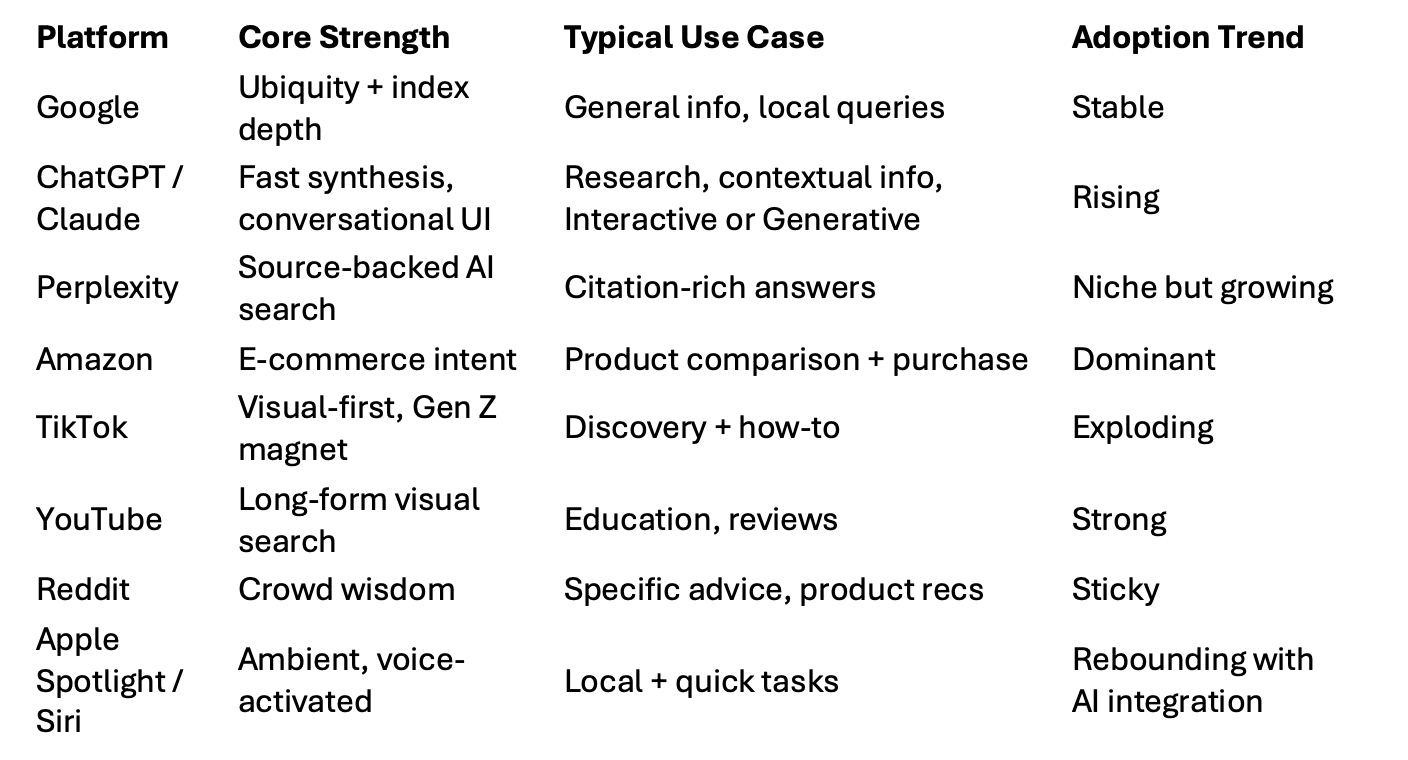
Is ChatGPT replacing Google? Is Perplexity eating away at market share? Are users changing their behaviors, or are we just caught in the hype cycle of innovation?
The rise of generative AI and a renewed focus on decentralized, intent-first platforms has shaken the very foundation of how we think about search. But before we throw away our SEO playbooks and pivot entirely to chat-based interfaces, let’s take a moment to step back and ask: What do the numbers say? Is Google still king—or just the default?
We’re entering a new era of discovery. And in 2026, the search battlefield will be more crowded, fragmented, and dynamic than ever.
If the past decade was defined by one rule—optimize for Google or disappear—the present is far messier.
Here's the reality: Google still holds the lion's share of global search traffic. According to the latest figures from StatCounter, Google commands over 89% of the worldwide search engine market as of mid-2025. That's not nothing—Bing hovers around 4%, with DuckDuckGo and Yahoo trailing behind.
So, does that mean nothing has changed?
Not quite.
Where it gets interesting is in how users search, and what they use when Google isn't the default.
Let's break down the emerging search behaviors of 2025:
So yes—Google is still dominant in raw volume. But in terms of mindshare and behavioral intent, things are shifting fast.
And when user habits shift, strategies must follow.
Let's be honest: many people were quick to declare the death of traditional search when ChatGPT first launched its web-browsing mode. And sure, it's a game-changer—especially for nuanced, research-heavy, or multi-step queries.
But is it replacing Google?
That depends on the task.
The key distinction here is the user intent: is it informational, transactional, synthesized or generative?
Traditional engines like Google excel at surfacing links, while AI tools excel at assembling and explaining them. It's not just a feature—it's a fundamental shift in how people expect to interact with information.
If you're not already building content that can live inside and feed AI models—such as FAQs, structured data, and high-authority answers—you're increasingly invisible in a future where zero-click results dominate the user experience.
Let's talk fragmentation. Gone are the days of one search engine ruling them all. Today, users search wherever their intent feels most aligned:
Each of these platforms is a search engine in its own right—optimized not for links, but for context, experience, and format. They reward different kinds of content, different metadata structures, and entirely different strategies.
They're also becoming stickier. Amazon's algorithm now personalizes not only products but also search results by geography, spending behavior, fulfillment method, and even browsing intent. TikTok's algorithm doesn't just match you with trending content—it serves content in response to both search queries and behavioral triggers.
And they're not just supplements to Google. In many cases, they replace it entirely.
TikTok alone has surpassed 1.8 billion global users, with more than half of Gen Z now using it as their primary discovery engine. That's not just a trend—that's a generational shift. It's the equivalent of what Google once was for Millennials.
Think of it like this: Google is still the main highway. But more and more drivers are taking exits—some temporarily, others permanently.
Here’s a simplified breakdown of where search attention is going in 2025:

The question isn’t which search engine wins. It’s where your audience starts their journey.
And spoiler: it’s rarely just one place anymore.
Here’s where it gets nuanced.
Are people abandoning Google? No.
But are they now defaulting to other tools based on task type, platform, and desired format? Absolutely.
It isn't a full-blown search migration. It's a modular behavior shift. And the more platforms train users to expect tailored, fast, frictionless answers, the more they'll resist clunky, ad-heavy SERPs.
Even in enterprise environments, search is becoming decentralized. Internal teams are embedding ChatGPT into workflows. Perplexity is being used to summarize technical documentation. Gemini is powering productivity tools in Workspace.
The average user's search stack is now a blend of:
In other words: Google isn't dying. But it's no longer the only path.
If your strategy still revolves entirely around blue links and keyword volume, you're playing a 2015 game in a 2025 arena.
Here's what your search and discovery strategy should include:
Make your content machine-readable and trustworthy:
Break your content down into channel-friendly formats:
Identify where your customers are starting their discovery journeys:
Match content format and tone to where and how discovery begins.
Click-based metrics won't tell the whole story in a discovery-first world. Track:
And don't forget about latent impact—how many users see your content or brand mentioned in an AI response, don't click immediately, but return later with a branded search?
If you're only measuring bottom-of-funnel clicks, you're missing the real story.
Let’s be clear: this isn’t the end of Google.
But it’s the end of search as a single-source, linear funnel. What we’re witnessing in 2025 is the decentralization of discovery—powered by AI, driven by intent, and fragmented by format.
Google still matters. But so, do:
The winners in this new search economy won’t be those who optimize for one engine. They’ll be the brands that show up intelligently, consistently, and contextually across many.
2025's top search engines aren't just competing on speed or accuracy—they're redefining how people ask, learn, and trust.
It's time to stop thinking about "search" as a monolith.
Instead, build a discovery strategy that:
Because if there's one truth emerging from this chaotic, exciting moment, it's this:
Search isn't about links anymore. It's about presence, precision, and positioning.
And that's something no single search engine can guarantee.
Discovery happens everywhere now—from TikTok to ChatGPT. Make sure your brand shows up where it matters. Need a little help getting started? Contact us today!
Not sure on your next step? We'd love to hear about your business challenges. No pitch. No strings attached.